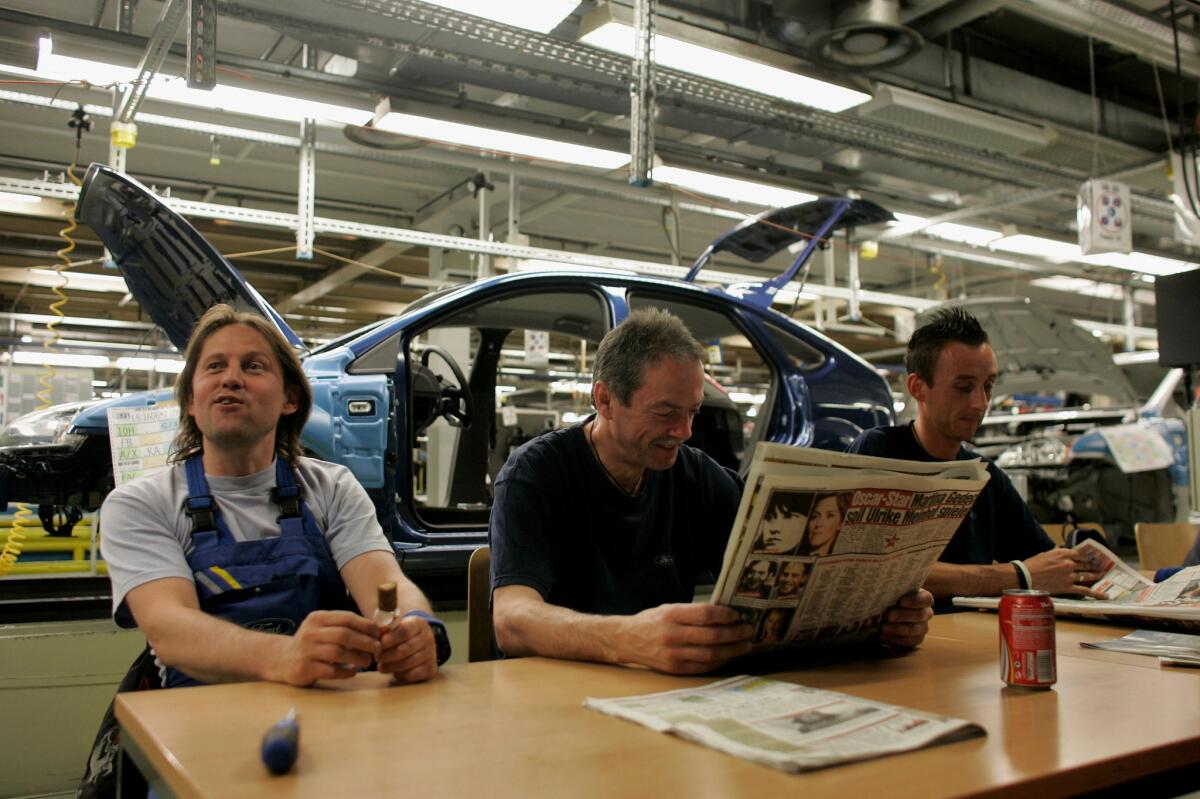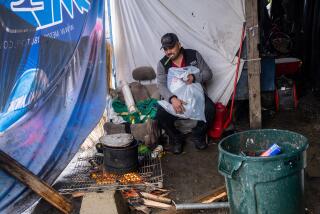If you were handed $1,100 a month, would you amount to anything?

Employees pause at a Ford plant in Saarlouis, Germany.
- Share via
Reporting from BERLIN — Would Germany be a better place if each citizen received a no-strings-attached government check for $1,100 a month?
Would people still get out of bed each day and go to work or do something else productive even with that unconditional basic income of 1,000 euros, less than half the average German monthly wage, but more than twice what those on welfare receive?
Those are among the questions being examined in a small real-life experiment called “Mein Grundeinkommen” (My Basic Income) taking place in Germany — where 26 people thus far are being given $1,100 a month to do whatever they want with.
The privately operated project, financed by crowdfunding donations, has injected new life into an old debate in Germany about utopian ideals. The idea of a “basic wage” is also touching a nerve in Germany and across Europe amid a rise in poverty and an increase in the number of working poor.
The notion of the state giving everyone an “emancipatory basic income,” as it also is sometimes called, is cherished not only by leftists in Germany but has also been supported by some on the right side of the political spectrum. Detractors, however, express fears that it would take away the incentive for people to work, while costing the government a fortune.
In Finland, a new conservative-led government announced plans this month to hand out a universal basic income of nearly $900 per month starting in 2017. The basic income payments would replace all other benefits, cutting administration and means-testing costs, and will be paid to everyone regardless of whether they have other sources of income. Opinion polls show 70% of Finns favor the idea, which will cost more than $50 billion a year. A referendum on the same question is due in Switzerland in February. There is growing support for a basic income in the Netherlands.
The universal basic income has long had many supporters in Germany. The state already pays a sort of “mini basic income” of about $200 per month for all children and young adults up to the age of 25 as long as they are in school or at college, which are also free of charge. But it was never tested in a real-life situation in Germany until Berlin entrepreneur Michael Bohmeyer, 31, decided to launch his “My Basic Income” project in 2014.
“A basic income paid out to everyone could unleash enormous amounts of creativity,” said Bohmeyer, who left his Internet start-up business, and for a while was savoring a relatively carefree life, living off those proceeds, when he came up with the basic payment experiment.
“Machines are going to be taking care of just about everything for us over time,” added Bohmeyer, who comes from formerly communist eastern Germany. “So to be able to work creatively, people need some security, they need to feel free. And they can get that with a basic income.”
At this point, 26 people have been chosen at random to get a taste of basic income. Every few weeks, several more people are selected through drawings to receive 1,000 euros per month each for a year. They’re free to do whatever they want with the money. The recipients are picked from a pool of more than 66,000 applicants and drawings are held whenever enough donations are collected. So far a total of 31,449 people have made donations.
“The most popular donation is 33 euros,” Bohmeyer says. “That’s equal to the daily amount needed to finance a basic income of 1,000 euros per month.”
At the last lottery on Dec. 8, held in front of a small but spirited audience at the Maxim Gorki Theater in Berlin and streamed on the Internet (1,100 people watched), five winners were selected: a woman who said she wanted to use the income to “spend more time with her children and do volunteer work”; another woman who said she wanted “to be able to live my dreams and give something back”; a third woman who said she wanted “to develop a theater production”; a man who said he would use the money “to hire a new employee to help my ecological vegetable garden business grow”; and a fourth woman who wrote she “wants to wake up happy every day, to travel more and support other artists.”
“It’s really cool that we were able to raise enough donations within less than a month for five more people to get the basic income for a year,” Bohmeyer said just before the drawing, which used a lottery wheel. “And that came mostly from small donations.”
Most people who win haven’t quit their jobs, he said. But there is nevertheless often a significant change in their outlook on life, he added.
“The one thing that everyone tells us is that they’re able to sleep much better,” Bohmeyer said. “But, ostensibly, not a lot changes: The students keep studying, the workers keep working and the pensioners are still pensioners. But there is a big change that takes place in their minds. People feel liberated and they feel healthier.”
One winner opted to spend his first month’s payment partying with his friends, Bohmeyer said. “He just felt an urge to do that,” he said. “He needed to get that out of his system.”
Bohmeyer said another winner, unable to work because of chronic ailments, wound up with less stress and fear than when he had to miss work.
“For the last nine months he hasn’t had any more episodes,” said Bohmeyer. “For a meager 1,000 euros per month, a human being has got his health back. Is that unreal, or what?”
One recipient did quit a job he that he said he hated: at a call center. But the young man from the western city of Muenster didn’t just lounge around on the couch watching TV all day; instead he used the money to go back to school and is studying to become a kindergarten teacher. He has managed to make ends meet after the year was over with other odd jobs and is grateful for the help he got to change his life, Bohmeyer said.
The idea of a basic income has four core elements: it’s universal, it’s individual, it’s unconditional, and it’s at a level that is high enough for a decent standard of living.
The project has caught the eye of German politicians like Katja Kipping, the co-leader of the hard left party Die Linke. She has long advocated a universal basic income. The Left Party discussed the issue intensively at its last congress in Bielefeld, although many party members were skeptical.
“It’s a good idea that is taking the discussion on basic income forward,” Kipping said after a visit to Bohmeyer’s offices.
She believes that a universal basic income in Germany could succeed because many people now work without remuneration and with too little recognition — caring for family members, housekeeping, volunteer work and coaching at clubs. “There is more work being done without pay than there is at the factories and office buildings and everywhere else.”
Economists are, not surprisingly, divided on the issue, with some labeling it “nonsense.” Political analysts don’t expect it to be introduced in Germany any time soon.
“The idea hasn’t even found a consensus in any of the parties,” said Carsten Koschmieder, at Berlin’s Free University. “There are just too many concerns in all the parties that people wouldn’t have any incentive to go to work and too many unanswered questions about who would pay for it all.”
Kirschbaum is a special correspondent.
More to Read
Sign up for Essential California
The most important California stories and recommendations in your inbox every morning.
You may occasionally receive promotional content from the Los Angeles Times.













